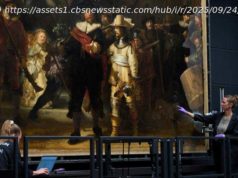 Peruvian dancers in colorful masks and elaborate headdresses are celebrating the Virgin of Candelaria in what’s considered the largest Roman Catholic festival in the Andes.
Peruvian dancers in colorful masks and elaborate headdresses are celebrating the Virgin of Candelaria in what’s considered the largest Roman Catholic festival in the Andes.
As many as 40,000 villagers are expected to gather for this year’s festival and show their respect for the patron saint of the communities along the shores of Lake Titicaca. The festivities start Thursday.
Competing groups dance under the intense sun in lovingly crafted costumes. Some wear shoes made with alpaca skin, collars hung with ears of corn, and hats adorned with old coins or the bright-colored feathers of Amazonian birds.
«We have danced this way since the time of our grandparents,» said 75 year-old Martin Mamani, who made the trek from the village of Esmeralda.
Some dances gesture toward everyday village activities such as grazing llamas or shearing animals. Others depict the Spanish conquest or the conscription of villagers as soldiers.
Even young children dance with their families in groups of as many as 400 people, including musicians who play flutes and other traditional instruments.
In addition to devotion, villagers have other reasons for dancing on the annual feast. Some are grateful to have been cured of disease, while others are asking for protection for their crops, or increased political power.
It’s a rare moment of national focus on an indigenous-dominated village culture.
«There’s always been a lack of respect for the countryside. But when the villagers participate, they are saying, ‘I am present,’ and the people from the city are only spectators,» said anthropologist Henry Flores, who has studied indigenous dances in the town of Puno.
The festival of La Candelaria has been celebrated in Puno every year since the 18th century. UNESCO declared the festival a cultural landmark in 2015.






